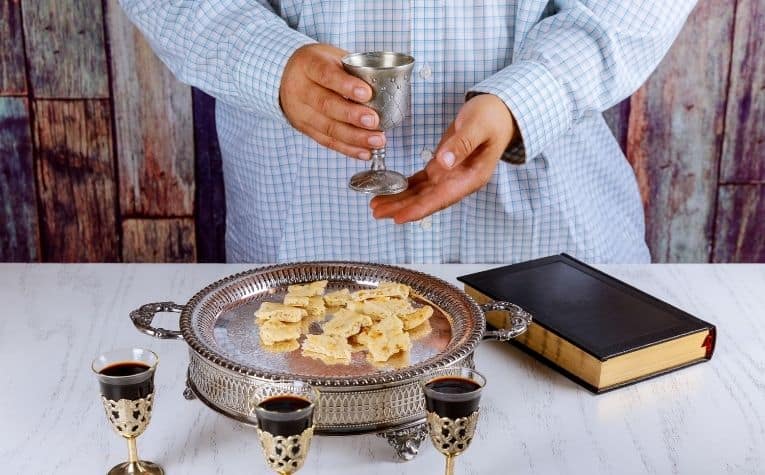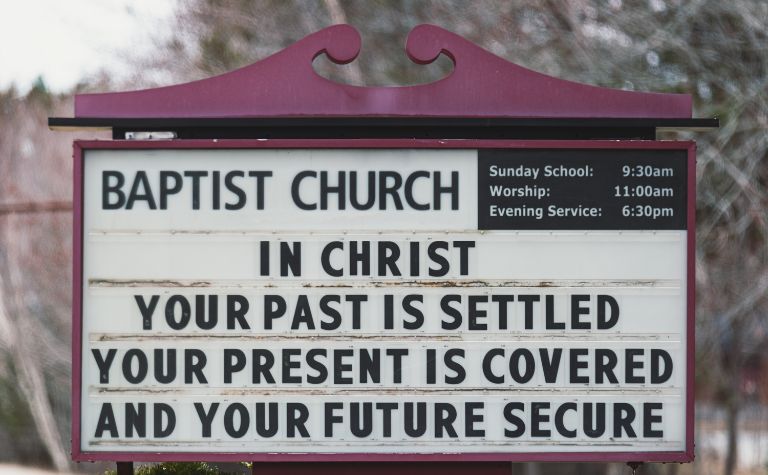From wedding celebrations to warnings about drunkenness, alcohol is a subject that readers encounter throughout the Bible. Historically, Christian denominations and traditions have offered their members instruction and wisdom on the consumption of alcohol, weighing the freedom each believer has and the serious dangers of intoxication.
Baptist churches have traditionally warned their members about the risks of drinking alcohol, although most acknowledge that consumption that doesn’t lead to drunkenness isn’t sinful. Many influential Baptists encourage abstinence, yet lay people can make their own choice without jeopardizing church membership.
What arguments do Baptists give in favor of abstinence? What arguments do Baptists give in favor of moderation? Have Baptists always been against drinking? What do modern Baptist leaders suggest? Keep reading to learn more.
Also, see Are Baptists Allowed to Dance? to learn more.

Baptists and Alcohol Consumption
All Baptists are opposed to drunkenness based on the clear teachings of the Bible, like Ephesians 5:18, “And do not get drunk with wine, for that is debauchery, but be filled with the Spirit.” (ESV) Aside from drunkenness, Baptists fall into two categories when it comes to drinking alcohol: (1) total abstinence is best, and (2) moderate drinking is permissible.
| Arguments for Abstinence | Arguments for Moderation |
|---|---|
| Wine in Bibles times was significantly diluted compared to wine today. | Christians should be aware of individuals around them that may have (or have had) a drinking problem and not use their freedom to cause others to stumble. |
| The Bible permits moderate drinking but not drunkenness. Jesus and the Apostles drank wine. (Luke 7:34, 1 Tim. 5:23). | Drinking alcohol moderately isn’t a bad witness because it’s not sinful. Making poor choices isn’t always the result of substance abuse. |
| Christians should use their freedom in Christ to abstain from alcohol. | Christians have the freedom in Christ to drink alcohol moderately. |
| Christians shouldn’t drink because a lot of people in society have problems with alcohol. | Christians should be aware of individuals around them that may have (or have had) a drinking problem, and not use their freedom to cause others to stumble. |
| Alcohol sometimes causes bad things like car accidents. | Car accidents also occur from texting while driving, so why isn’t the prohibition of texting in every circumstance suggested? |
| Positive depictions of alcohol in the Bible (e.g., Amos 9:14) don’t grant believers permission to drink it. | The Bible uses the imagery of alcohol to reflect God’s blessings (e.g., Amos 9:14). |
Also, see What’s the Difference Between First Baptists and Second Baptists? to learn more.
Alcohol In the Baptist Tradition
The root of the Baptist branch is the 16th-century Protestant Reformation, which sought to call the Roman Catholic church back to the inspiration and authority of Scripture over and above ecclesiastical tradition. (Also, see Baptists vs. Catholics: What’s the Difference?)
The leaders of the Reformation accused the Catholic church of a variety of abuses in their protest. The Baptist tradition inherited some of these concerns.
Some leaders of the Protestant movement, like Ulrich Zwingli of Switzerland and John Calvin of France, criticized the consumption of alcohol within the leadership of the Catholic church.
They took practical steps like strictly regulating drinking establishments and taught about the sinfulness of drunkenness according to the Bible.
There is evidence that Calvin didn’t support complete abstinence from drinking alcohol. [1] Some Reformers, including some of the early Baptists, preached strongly against drunkenness but didn’t demand abstinence from their members.
Also, see What Do Baptists Believe? to learn more.

Wine In the Baptist Confession of 1689
One of the earliest belief statements in the Baptist tradition assumed the consumption of wine, especially during the Lord’s Supper:
- Point 3: The Lord Jesus hath in this Ordinance, appointed his Ministers to Pray, and bless the Elements of Bread and Wine, and thereby to set them apart from a common to an holy use, and to take and break the Bread; to take the Cup, and to give both to the Communicants.
- Point 5: The outward Elements in this Ordinance, duely set apart to the uses ordained by Christ, have such relation to him crucified, as that truely, although in terms used figuratively, they are sometimes called by the name of the things they represent, to wit the body and Blood of Christ; albeit in substance, and nature, they still remain truly, and only Bread, and Wine, as they were before.
- Point 6: That doctrine which maintains a change of the substance of Bread and Wine, into the substance of Christs body and blood by consecration of a Priest, or by any other way, is repugnant not to Scripture alone, but even to common sense and reason; overthroweth the nature of the ordinance, and hath been and is the cause of manifold superstitions, yea, of gross Idolatries.
C.H. Spurgeon, the 19th century Baptist pastor, said, “Drunkenness is the devil’s back door to hell and everything that is hellish. For he that once gives away his brains to drink is ready to be caught by Satan for anything.”
Also, see Baptists vs. Assemblies of God: What’s the Difference? to learn more.
Wine In Early American Christianity
The early Christians in America ranged in their views on drinking alcohol. The Pilgrims brought 7,500 gallons of alcohol on their journey across the Atlantic.
They drank alcohol during many social functions, including church events like ordinations. Drunkenness, however, was always considered sinful based on the clear biblical teaching about it.
This quote from Increase Mather (1639-1723) reflects the views of many Reformed Protestants at the time. “Drink is in itself a good creature of God, and to be received with thankfulness, but the abuse of drink is from Satan; the wine is from God, but the drunkard is from the Devil.”
Abstinence has largely characterized the Baptist tradition in America, though there were individual exceptions. Critics alleged that while many Baptists publicly advocated for abstinence and supported Prohibition (1920-1933), some privately consumed alcohol in their homes.
Modern Baptist Leaders
In the 20th century, several influential Baptist leaders encouraged abstinence:
- Baptist Billy Graham, American evangelist (1918-2018): “The Bible condemns the use of any substance which alters or distorts our thinking, including alcohol, which was the most common drug in ancient times.”
- Albert Mohler, President of Southern Baptist Theological Seminary: “I serve as president of an institution that before God believes that the best position to hold is a total-abstinence position, in accountability to other Christians, and in accountability to the churches.”
- John Piper, retired pastor: “I don’t think anyone can make a case from Scripture that teetotalism is required. If you choose not to drink alcohol like I do, as a kind of default way of life, it needs to be based on some principle other than what the Bible requires of us.”
Also, see What Bible Translation Do Baptists Use? to learn more.

The Southern Baptist Convention On Alcohol
The SBC is the largest Baptist denomination and the largest Protestant denomination in America. The Convention has always championed abstinence for its leaders, pastors, and church members. The influential denomination has articulated several statements about its stance.
SBC Resolution on alcohol adopted at the annual meeting of 1983:
| WHEREAS, Previous Southern Baptist Conventions have passed resolutions on many occasions about the destructive effects of beverage alcohol consumption; and |
| WHEREAS, Beverage alcohol consumption is responsible for untold thousands of accidents, deaths, illness, and dysfunctional families; and |
| WHEREAS, We acknowledge that alcohol use is a problem that affects some members of Southern Baptist churches. |
| Be it therefore, RESOLVED, That the messengers to the Southern Baptist Convention, meeting June 14-16, 1988, in San Antonio, Texas, express our total opposition to the advertising, manufacturing, distribution, sale, and consumption of alcoholic beverages; and |
| Be it further RESOLVED, That we support stringent laws which will both deter drinking and driving, and also ensure swift prosecution of those who are accused of such; and |
| Be it further RESOLVED, That we urge Southern Baptists to work toward making these views known through secular and spiritual organizations, including local, state, and national governments; and |
| Be it finally RESOLVED, That we commend organizations which treat alcohol related problems as well as those organizations which promote prevention, using scripturally based principles. |
Are Baptist Views On Drinking Alcohol Changing?
There have always been Baptists that have championed abstinence and others who have argued that drinking alcohol moderately is permissible.
The internet has made these voices louder, but they aren’t necessarily arguing different points than advocates of each position were a century ago.
Also, see Christian Denominations Comparison Chart to learn more.
Please see the related articles below.
References:
[1] Source
[2] Source
[3] Source
Related Questions
The Baptist tradition is one of the largest branches of Christianity in America and around the world. Historically, some Protestant denominations have prohibited their members from activities like...
The Baptist tradition, like other branches of the Christian faith, has a variety of expressions. The different names of denominations and churches within the tradition reflect this. Understanding...
